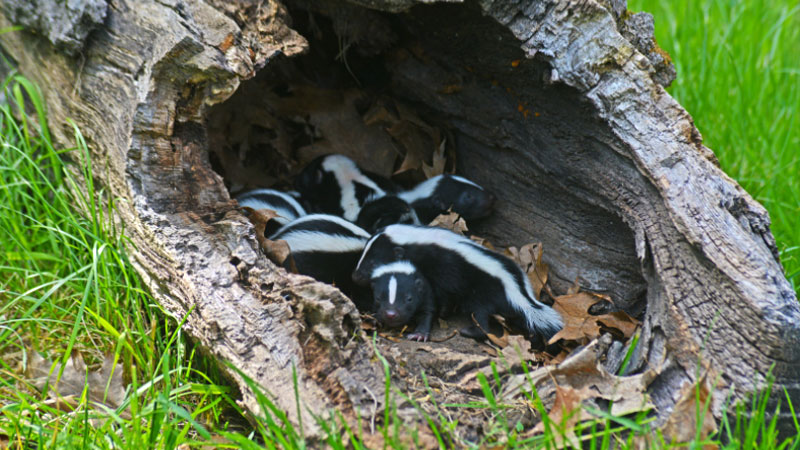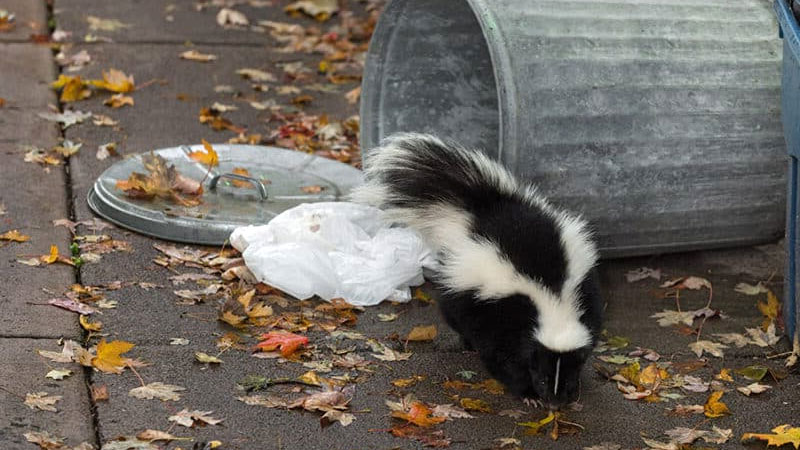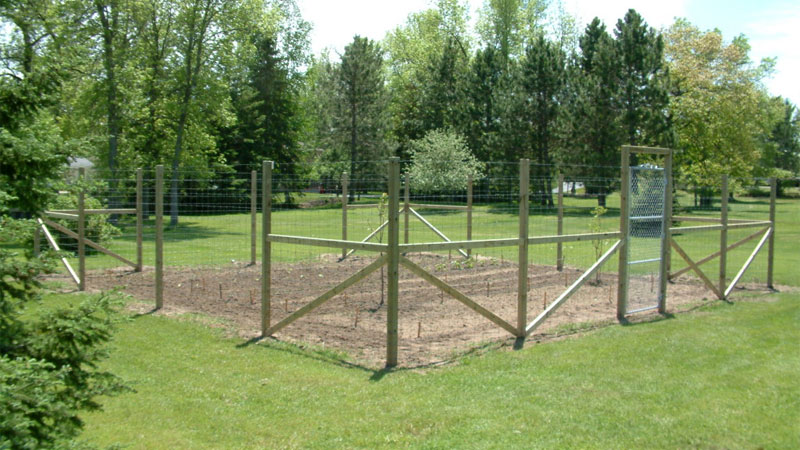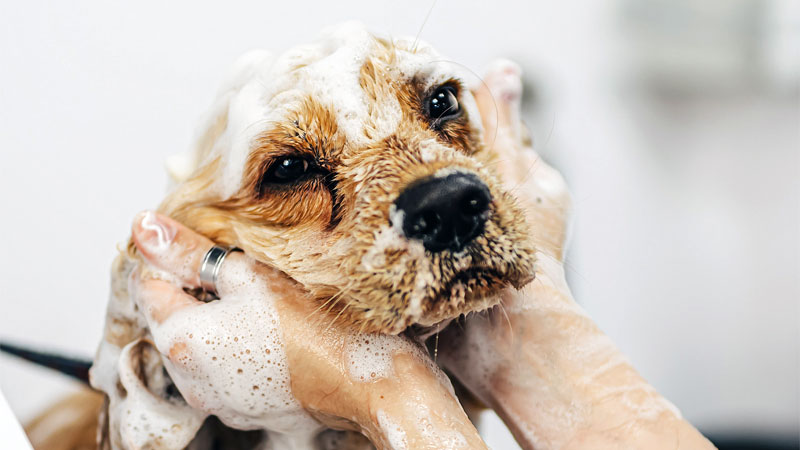Few backyard pests bring the same level of anxiety and dread as catching a whiff of skunk.
Whether you’ve been noticing an unpleasant musky smell coming from under your porch or deck or have seen telltale signs of skunks foraging in your garden or digging for grubs in your lawn, you’ll want to take action.
Encouraging skunks to leave your property is a relatively easy thing to accomplish. They are shy, reclusive animals and truly do not want to confront you or your pets. And when they get cornered and feel vulnerable, they usually give several warnings before using their dreaded defense—that powerful, stinky spray.
But things are not likely to get to that point (unless you have a dog who gets interested in the skunk). More on that later—let’s get to some strategies for repelling skunks.
See Also: How to Humanely Get Rid of Skunks
Remove Elements that Attract Skunks

One of the most effective ways to repel skunks from your yard is to eliminate what brings them there in the first place. Skunks are drawn to food sources as they forage at night, so restricting access should be your first line of defense.
Pet Food and Water Bowls
Pet food that is left outdoors is one of the main magnets for skunks in suburban areas. Never leave pet food or water sitting overnight outside. Bring bowls inside before dusk so as not to attract skunks and other wildlife.
See Also: 13 Skunk Facts That Will Leave You Holding Your Breath
Accessible Compost
If you compost in an open bin, this delicious mixture of fruit and vegetable scraps may prove irresistible to skunks. Invest in a closed compost tumbler, or add a sturdy lid and bungee cords to keep skunks from raising the cover.
Make sure enclosures don’t have any gaps or holes providing access. Rotate compost frequently so smells don’t accumulate.
In the same way, make sure any garbage cans that may have food scraps are fully closed and secured. Opossums aren’t the only critter that love to go through your garbage although it’s usually a stronger animal that will actually tip a garbage can over.
Potential Denning Areas
Skunks seek out sheltered spots to establish dens, which are often located under porches, sheds, or decks. They only use dens in winter for breeding and birthing young, but will bunker down there overnight and return to the same areas.
Block off foundation openings with wire mesh, sheet metal, rocks, fencing or other barriers. Be sure to wait until dusk when skunks have exited before sealing off any suspected dens.
Removing these prime food sources and habitat refuges will make your landscape much less welcoming to skunks seeking places to feed and nest. Coupled with adding natural repellents (see next section), restricting access should convince skunks to move on.
Employ Natural Repellents
Now that you’ve made your yard less hospitable to skunks, the next step is actively encouraging them to leave and stay away through scent deterrents. Natural repellents use smells that skunks instinctively avoid without causing any harm.
Predator Urine
Fox and coyote urine contains sulfur compounds that simulate predator scent, triggering skunks’ innate fight-or-flight response. Sprinkle patches around the perimeter of your yard or areas where skunks appear.
Reapply every few days after rain or lawn watering to renew the scent. Predator urine is available at most hardware stores and online.
- Can be used as a cover scent, bottled in a convenient squirt-top bottle
- May chase rabbits, voles or mice from gardens/yards, may squirt in a line if...
- May be applied to bark or around base of plants, but do not use on tender plants...
Repellent Plants
Certain plants have strong odors that can override other attractants and drive skunks away. Dried chili pepper, pepper spray, garlic, onions and other pungent spices invoke a sense of danger.
Crush up pepper flakes and mix with water to create a liquid repellent. You can also place open bags or pouches of these dried items around known skunk haunts.
Ammonia-Soaked Rags
Skunks associate the scent of ammonia with predator urine. Soak old rags in household ammonia and place them in areas of suspected skunk activity. Be sure to wear gloves when handling ammonia, and replace the cloths every few days as the scent diminishes. This imitation predator smell may be enough to make your yard uninviting.
Use Physical Devices to Deter Skunks
In addition to scent repellents, you can incorporate physical barriers and deterrents to scare skunks away from your yard. These objects introduce sudden sounds, lights, and movement that frighten cautious skunks.
Motion-Activated Sprinklers
Skunks have poor eyesight but a keen sense of hearing. When triggered, motion-activated sprinkler systems spray a strong stream of water in the direction of movement.
Position them along frequented skunk paths or near gardens. The unexpected splash when activated scares skunks, conditioning them to avoid the areas.
Fencing
For especially stubborn skunks invading gardens or yards, erect a temporary physical barrier like plastic garden fencing or poultry wire. Or even better, make a permanent fence around your garden to keep skunks and other critters out.
Bury fencing 6 inches into the ground to block digging underneath.
Flashing Lights and Sounds
Maybe don’t use this method if you have nearby neighbors, but solar-powered lights, pinwheels adorned with shiny strips of metal, old CDs dangling from strings – these visual stimuli are ambiguous and therefore intimidating. Mix in clanging pie tins, plastic bottles filled with coins or other noisemakers triggered by movement. The distracting lights and sounds create an unpleasant environment.
The main concept behind using physical deterrents is introducing elements of surprise, discomfort and perceived danger. Alone they may not permanently solve skunk issues, but used consistently in coordination with other tactics, you can condition skunks to give your property a wide berth.
Be prepared to move devices around until finding what works best for your landscape.
See Also: What Do Skunks Sound Like?
Getting a Little Help
In the unlikely event that none of the above ideas worked on your particular skunk situation, maybe it’s time for a little professional help. If you decide that’s the case, click the link below to get started.
If Your Dog Gets Skunked…
As mentioned earlier, dogs—bless their innocent, curious natures—do not typically know what to make of a skunk’s warning signs, and can end up with a good dose of a skunk’s best defense on them.
You can opt for an effective commercial product to freshen up your dog, or you can mix up something that will work just as well with common household products.
Mix a quart of hydrogen peroxide, 1/4 cup of baking soda, and a teaspoon of liquid dish soap in a bowl, then use a washrag to bathe the dog thoroughly with this mixture, rinse, then shampoo and rinse again.
The bad odor will be magically gone. If your dog was sprayed in the face, expect bad breath for a prolonged period. Hopefully he’ll remember his experience if he has an encounter of the skunk kind again, but don’t count on it!
- How to Identify Skunk Poop (With Pictures) - April 1, 2024
- You Really Don’t Need That Opossum Trap - January 4, 2024
- How to Set a Mouse Trap Without Getting Hurt - December 28, 2023




